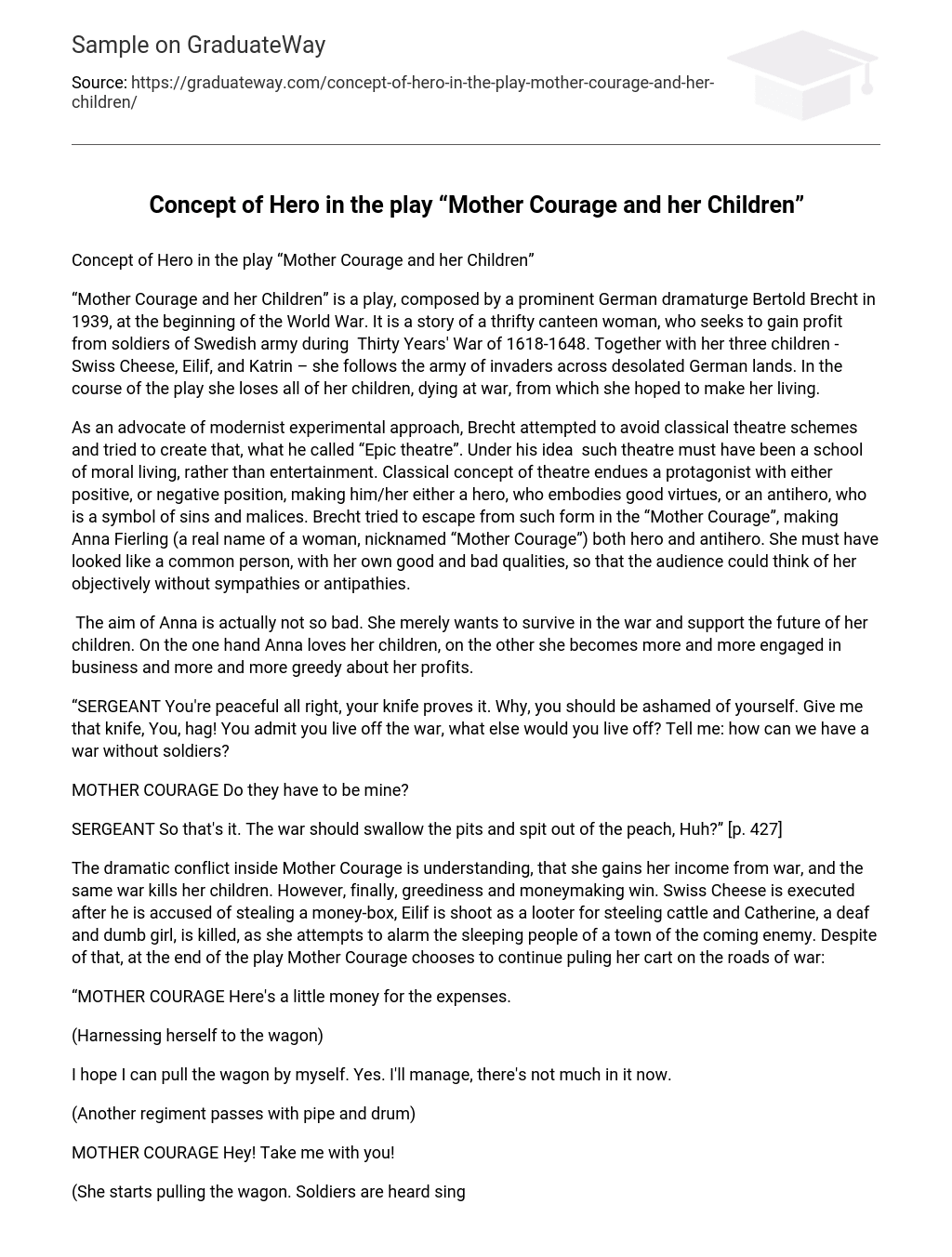“Mother Courage and her Children” is a play, composed by a prominent German dramaturge Bertold Brecht in 1939, at the beginning of the World War. It is a story of a thrifty canteen woman, who seeks to gain profit from soldiers of Swedish army during Thirty Years’ War of 1618-1648. Together with her three children – Swiss Cheese, Eilif, and Katrin – she follows the army of invaders across desolated German lands. In the course of the play she loses all of her children, dying at war, from which she hoped to make her living.
As an advocate of modernist experimental approach, Brecht attempted to avoid classical theatre schemes and tried to create that, what he called “Epic theatre”. Under his idea such theatre must have been a school of moral living, rather than entertainment. Classical concept of theatre endues a protagonist with either positive, or negative position, making him/her either a hero, who embodies good virtues, or an antihero, who is a symbol of sins and malices. Brecht tried to escape from such form in the “Mother Courage”, making Anna Fierling (a real name of a woman, nicknamed “Mother Courage”) both hero and antihero. She must have looked like a common person, with her own good and bad qualities, so that the audience could think of her objectively without sympathies or antipathies.
The aim of Anna is actually not so bad. She merely wants to survive in the war and support the future of her children. On the one hand Anna loves her children, on the other she becomes more and more engaged in business and more and more greedy about her profits.
“SERGEANT You’re peaceful all right, your knife proves it. Why, you should be ashamed of yourself. Give me that knife, You, hag! You admit you live off the war, what else would you live off? Tell me: how can we have a war without soldiers?
MOTHER COURAGE Do they have to be mine?
SERGEANT So that’s it. The war should swallow the pits and spit out of the peach, Huh?” [p. 427]
The dramatic conflict inside Mother Courage is understanding, that she gains her income from war, and the same war kills her children. However, finally, greediness and moneymaking win. Swiss Cheese is executed after he is accused of stealing a money-box, Eilif is shoot as a looter for steeling cattle and Catherine, a deaf and dumb girl, is killed, as she attempts to alarm the sleeping people of a town of the coming enemy. Despite of that, at the end of the play Mother Courage chooses to continue puling her cart on the roads of war:
“MOTHER COURAGE Here’s a little money for the expenses.
(Harnessing herself to the wagon)
I hope I can pull the wagon by myself. Yes. I’ll manage, there’s not much in it now.
(Another regiment passes with pipe and drum)
MOTHER COURAGE Hey! Take me with you!
(She starts pulling the wagon. Soldiers are heard singing)” [p.451]
The personality of Anna Fierling can hardly be called positive, however, she is also not expressly negative. Evaluating it a spectator definitely takes time and situation into account and compares the protagonist to characters around her, arriving to compassion. Understanding, that the audience is likely to sympathize Mother Courage, Brecht used several innovatory techniques to separate a spectator from a hero. He firstly contrasts Catherine’s self-devotion with selfishness of her mother, however, even Brecht himself recognized, that such mean is ineffective, because a protagonist always possess greater abilities for empathy, than other characters, and Mother Courage still remains quite sympathetic for the audience. The unusual situation in the case becomes justification for Anna.
Another Brecht’s innovation was alienation of characters from audience. In order to achieve this effect, he firstly placed the action into the past, since evaluating past always requires certain level of abstraction. The second effect, used by Brecht is connection of the protagonist with secondary characters and backgrounds. Mother Courage’s thinking and moral principles are not different from thinking and principles of her surrounding, she is just one of thousands similar heroes. Such approach characterizes Brecht’s modernist views and contrasts to classical concept of the tragic hero. Even though Anna loses her children, her role can yet hardly be recognized tragic. She just accepts death as a part of her life and she lacks tensed inside monologue, which distinguished tragic heroes in classical approach. The play reaches it’s culmination as Mother Courage together with her cart merges inside a crowd of soldiers at the end.
In can be stated, that Brecht failed to make Mother Courage an example of moral decay. He sought to make Anna Fierling an epic hero, a symbol of covetousness of business, which, if not supports war, at least does not refuse, being unable to recognize dramatic consequences. Nevertheless, despite of his innovations in technique of the play, a spectator is still likely to sympathize Mother Courage. For him, Anna’s poor qualities are balanced, if not dominated by her charm and optimism even in the hardest times. So, the protagonist’s message in the “Mother Courage” has not become a moral warning at the beginning of war, as it has been thought by Brecht. Anna Fierling is more likely to say: “Cheer up! We will survive that”.
References
1. Bertolt Brecht (1978), Mother Courage and Her Children, Seoul: Pan Korea Book Corp.





